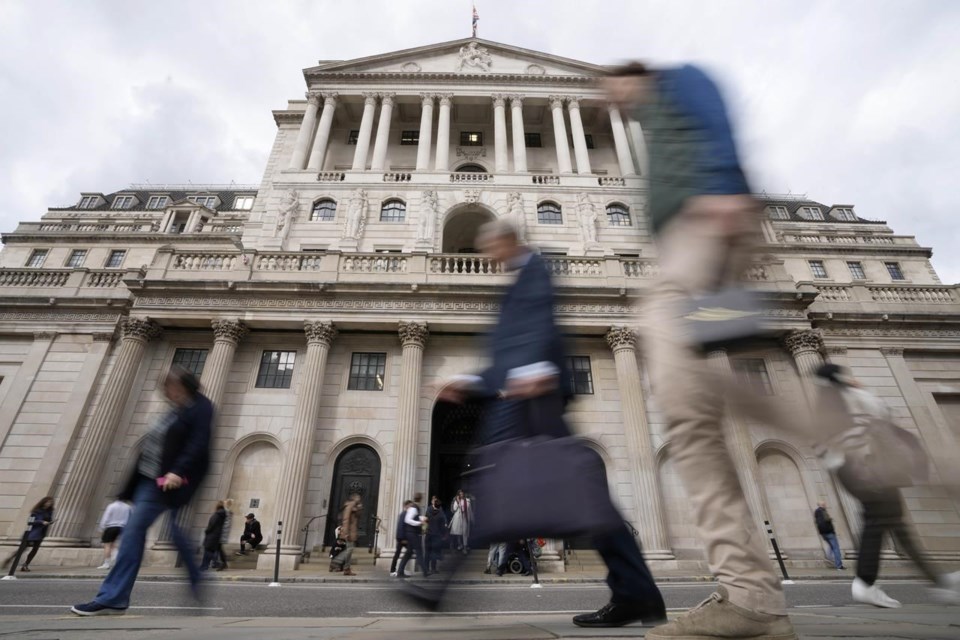LONDON (AP) ŌĆö The Bank of England on Tuesday expanded its emergency effort to quash upheaval on financial markets unleashed by the governmentŌĆÖs plan to slash taxes, saying fluctuations in bond prices posed a .
The U.K. central bank said it will now buy inflation-linked securities ŌĆö which offer protection from inflation ŌĆö as well as conventional government bonds as it seeks to . Purchases will total up to 10 billion pounds ($11 billion) a day split evenly between both types of bonds, and the program will end Friday as originally planned, the bank said in a statement.
Analysts say pension funds lobbied the central bank to extend the program by two weeks, but Bank of England Governor Andrew Bailey stuck to the timeline in an appearance at the annual meeting of the Institute of International Finance in Washington. He said portfolio managers have three days to rebalance their positions.
The bank broadened the program after yields on government bonds jumped again Monday, returning to the levels reached immediately after the government last month without saying how it would pay for them. That raised concerns about a surge in government borrowing that spooked markets, sending the and endangering pension funds.
The bond-buying program addresses concerns on the so-called secondary market, where investors trade bonds previously purchased from the government. Bond prices tend to fall as concerns about a borrowerŌĆÖs ability to repay its debts increase. This pushes the yield ŌĆö or the return investors realize on their money ŌĆö higher because they receive the same interest rate on a smaller investment.
Investors are concerned that the governmentŌĆÖs plans will lead to high levels of debt and , which is already running at a near . The Institute for Fiscal Studies, an independent think tank, said Tuesday that stabilizing government debt levels will require ŌĆ£difficult decisionsŌĆØ on a combination of spending cuts and tax increases.
Pension funds have been particularly hard hit by the turmoil over government spending priorities, with some being forced to sell bonds to cover payment obligations.
While investment funds have made ŌĆ£substantial progressŌĆØ in reducing their risks, there were further big moves in government bond prices at the beginning of the week, particularly for index-linked bonds, the bank said.
ŌĆ£Dysfunction in this market, and the prospect of self-reinforcing ŌĆśfire saleŌĆÖ dynamics pose a material risk to U.K. financial stability,ŌĆØ the bank said in a statement.
The market turmoil began on Sept. 23, when Treasury chief Kwasi Kwarteng introduced the in the House of Commons.
The plan includes 45 billion pounds of tax cuts and at least 60 billion pounds of increased spending to help shield homes and businesses from this winter. The government hasnŌĆÖt yet detailed how it will pay for the program, except to say faster economic growth will increase tax revenue.
In an effort to ease concerns, Kwarteng said Monday that he would release the governmentŌĆÖs detailed plans on Oct. 31, three weeks earlier than scheduled.
Critics say the governmentŌĆÖs target for average economic growth of 2.5% a year is substantially higher than most economists predict and will be difficult to achieve.
The government may have to cut spending by as much as 62 billion pounds a year to achieve targets for controlling public debt, the IFS said in an analysis released Tuesday.
ŌĆ£Recent events have illustrated the importance of a credible strategy and plan for fiscal sustainability,ŌĆ│ the IFS said. ŌĆ£Just as financial markets ŌĆö which ultimately have to lend the money required to plug the gap in the governmentŌĆÖs fiscal plans ŌĆö might be unconvinced by plans underpinned by an assumption of a miraculous uptick in growth, so too might they be unconvinced by plans underpinned by vague promises of public spending cuts far into the future.ŌĆØ
Danica Kirka, The Associated Press




